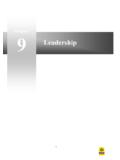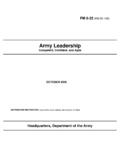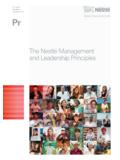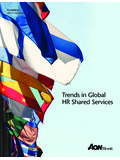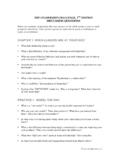Transcription of Guidelines for Ethical Aboriginal Research - …
1 A RESOURCE MANUAL FOR THE DEVELOPMENT OF Ethical AND CULTURALLY APPROPRIATE COMMUNITY-BASED Research WITHIN THE FIRST NATIONS COMMUNITIES IN THE MANITOULIN AREA Guidelines for Ethical Aboriginal Research Developed by members of the Aboriginal Health Research Review Committee in collaboration with Manitoulin First Nations leadership and community agencies Endorsed by GEAR - Guidelines for Ethical Aboriginal Research in the Manitoulin Area 1 TABLE OF CONTENTS PAGE Letter of Introduction _____ 1 Overview _____ 2 Background _____ 3 Our Vision for Culturally Appropriate Aboriginal Health Research on Manitoulin Island _____ 5 Ethical Research Guidelines for Community-Based Health Research in First Nations in the Manitoulin District _____ 6 The Ethics and Research Review Process _____ 11 Strategies for Forming A Community Based Research Steering Committee _____ 14 Appendices: Appendix A: Glossary of Definitions Related to Research and Ethics _____ 16 Appendix B: Bibliography - Aboriginal Research Resources _____ 20 Appendix C: Sample Research Agreement Forms _____ 22 Appendix D.
2 Agency Board and Committee Motions in Support of GEAR _____ 26 Copyright 2003 by Noojmowin Teg Health Centre Noojmowin Teg Health Centre RR# 1, PO Box 177 Little Current, Ontario, P0P 1K0 Do not copy without written permission of the copyright holder GEAR - Guidelines for Ethical Aboriginal Research in the Manitoulin Area 2 LETTER OF INTRODUCTION March 2003 On March 5th and 6th, 2001 Noojmowin Teg Health Access Centre sponsored a community-based health Research conference to provide a forum for participants to discuss their experiences with health Research on Manitoulin. Approximately 45 people attended this workshop, which brought together health care workers, community members, elders and local as well as university based researchers and students. Participants brainstormed about what makes Research Ethical from a First Nations perspective and how the goal of Ethical Research could be realized.
3 Conference participants then created a Vision for Ethical health Research on Manitoulin. Since Noojmowin Teg Health Access Centre services all seven First Nations as well as the off-reserve population in the Manitoulin district and also had a Research & Evaluation Program in place, it became the lead organization in forming the Research Review Working Committee. The committee was a collaboration among Noojmowin Teg Health Access Centre, Mnaamodzawin Health Services, Wikwemikong Health Centre, M Chigeeng Health Centre and the Kenjgewin Teg Educational Institute. Presentations were made to the respective boards and committees and it was unanimously supported. The committee developed Research and ethics Guidelines based on the perspectives of local First Nations and this manual is based on those Guidelines . This manual was developed by the Research Review Working Committee to promote Ethical health Research in First Nations communities in the Manitoulin district.
4 The manual outlines strategies to assist agencies to make informed decisions about health Research in their community by providing Guidelines for the review and evaluation of proposed Research projects. The working committee would like to thank all the First Nations agencies who helped to create this manual through their support: Kenjgewin Teg Educational Institute M Chigeeng Health Services Committee Mnaamodzawin Health Services Inc. Noojmowin Teg Health Centre Wikwemikong Health Services Committee United Chiefs and Councils of Manitoulin Za-geh-do-win Information Clearinghouse Northeastern Ontario Medical Education Corporation Through Research we can identify our strengths and weaknesses, and produce information that will help to improve the services in our health centres and keep track of the health priorities in our communities.
5 It is our hope that this manual will help to identify Research that is useful and empowering to the First Nations communities. GEAR - Guidelines for Ethical Aboriginal Research in the Manitoulin Area 3 Respectfully submitted by the members of the Research Review Working Committee: Cheri Corbiere, Community Health Representative, Sheshegwaning First Nation Donna Debassige, Executive Director, UCCM Tribal Council Barbara Erskine, Psychologist, Noojmowin Teg Health Centre Steven Fox-Radulovich, Information Technology Analyst, Kenjgewin Teg Educational Institute Joyce Helmer, Director of Education & Professional Development, Northeastern Ontario Medical Education Corporation Phyllis Kinoshameg, Researcher, Wikwemikong Health Centre Diana Lariviere, Chair Person, Noojmowin Teg Health Board Marion Maar, Research & Evaluation Coordinator Noojmowin Teg Health Centre Lenore Manitowabi, Program Support Worker, Noojmowin Teg Health Centre Niki Naponse, Executive Director, Za-geh-do-win Information Clearinghouse Peggy McGregor, Executive Assistant, Noojmowin Teg Health Centre Mariette McGregor-Sutherland.
6 Executive Director, Noojmowin Teg Health Centre Marjory Shawande, Traditional Coordinator, Noojmowin Teg Health Centre Christina Taibossigai, Nurse Manager, Mnaamodzawin Health Services The Research Review Committee would also like to thank Northeastern Ontario Medical Education Corporation (NOMEC) for sponsoring the printing of this document. GEAR - Guidelines for Ethical Aboriginal Research in the Manitoulin Area 4 OVERVIEW The Research Guidelines Manual outlines tools and strategies designed to help agencies and communities make informed decisions about developing and managing health Research in their communities. Included in this manual are: 1. Background information on why and how this document was developed. 2. A vision for community-based Aboriginal health Research based on Aboriginal values and promoted by the Research Review Committee in the Manitoulin District.
7 3. Ethical Research Guidelines for community-based health Research in First Nations in the Manitoulin district to ensure Research projects respect local Aboriginal people and culture as well as adhere to high scientific standards. 4. Guidelines for the review process of Research proposals by community agencies. 4. Using a steering committee to guide implementation of Research projects 5. Appendices include a glossary of terms, sample Research contracts and forms and references for additional reading. The Guidelines were developed from the perspective of health Research , however the Research Review Working Committee was advised by community members and leadership repeatedly that the Guidelines should be applicable to any kind of Research projects in the First Nations in the Manitoulin district. We hope that the ideas shared in this document are useful for agencies, community-based researchers and external health researchers in their efforts to conduct meaningful and action oriented Research with First Nations agencies and communities.
8 GEAR - Guidelines for Ethical Aboriginal Research in the Manitoulin Area 5 BACKGROUND Past experiences with Research in the Manitoulin District Over the past years, local First Nations communities were often contacted by academic researchers or other agencies to participate in health Research projects. Despite these Research activities many community agencies did not have access to relevant community health information to plan and develop community programs. At the community level, many people felt that their First Nations were being researched to death ; however, there was no noticeable benefit to their community. Research activities were not designed to benefit the community and rarely lead to action or change. Community agencies were also becoming increasingly concerned about the ethics of some of the Research projects that were conducted locally, particularly the lack of community control over the Research projects.
9 While Research fatigue is growing among community members, First Nations agencies and leadership are under increasing pressure to conduct their own Research to provide funding agencies with reliable data to support community-based initiatives. As communities are taking over the delivery of their health services, agencies are also in need of reliable Research data on the health status in their communities and the effectiveness of their health programs. Creating a vision for community health Research On March 5th and 6th, 2001 Noojmowin Teg Health Centre sponsored a community-based health Research conference in M Chigeeng to provide a forum for participants to discuss their experiences with health Research on Manitoulin. The workshop was advertised in local papers and in the health agencies. Approximately 45 people attended this workshop, which brought together health care workers, community members, elders and local as well as university based researchers and students.
10 Participants brainstormed about what makes Research Ethical from a First Nations perspective and how the goal of Ethical Research could be realized and thus created a vision for health Research . Recommendations from the first Research workshop Following the recommendations from this meeting, a working committee was formed to facilitate collaboration among the following First Nations agencies: Noojmowin Teg Health Centre, Wikwemikong Health Centre, M Chigeeng Health Services, Mnaamodzawin Health Services, UCCM Tribal Council and Kenjgewin Teg Educational Institute. This working committee for health Research was to develop Ethical Research Guidelines . Participants identified Noojmowin Teg as the agency responsible for coordinating this phase, since this health centre already had a Research mandate and a full time position for a Research coordinator.
